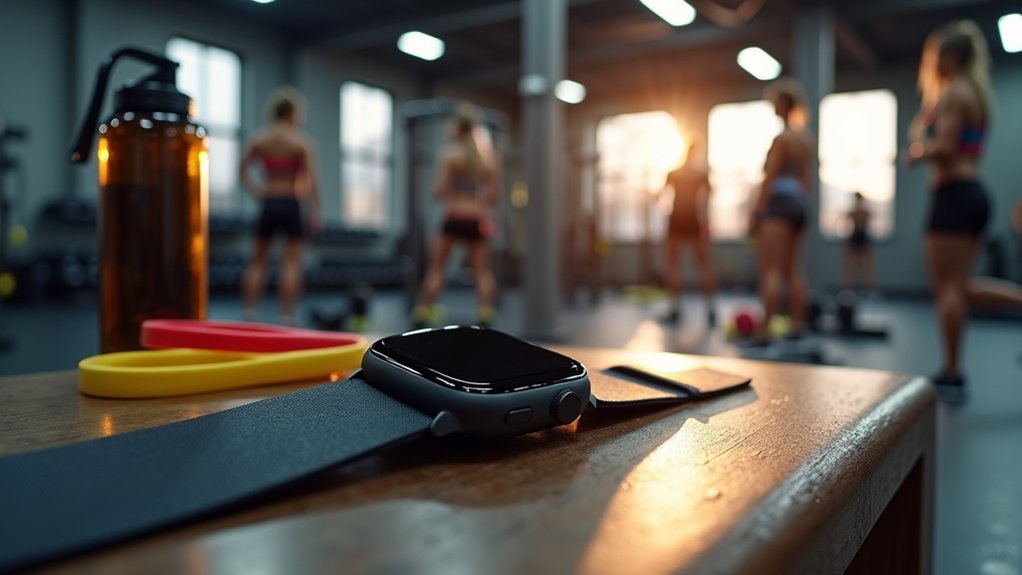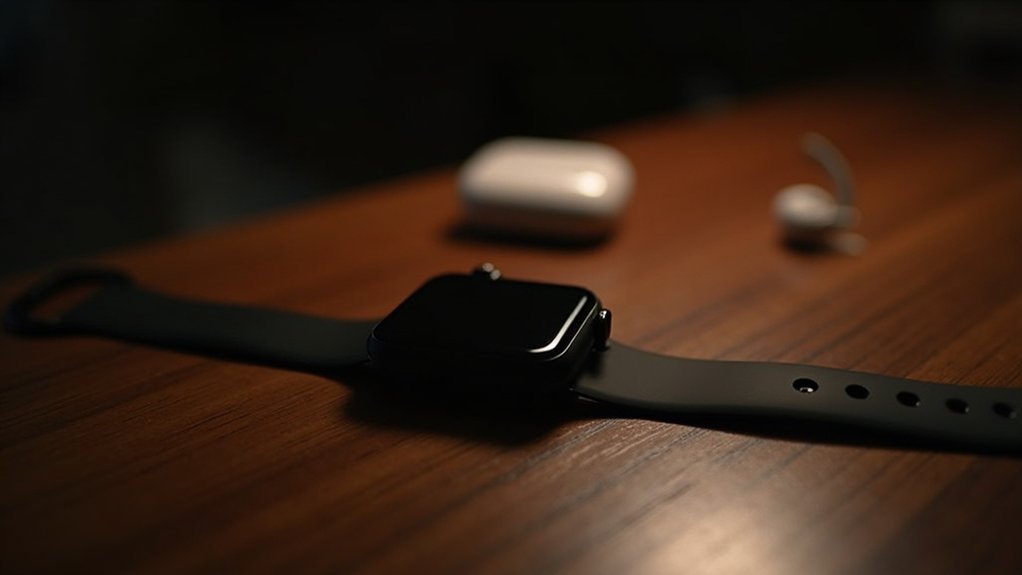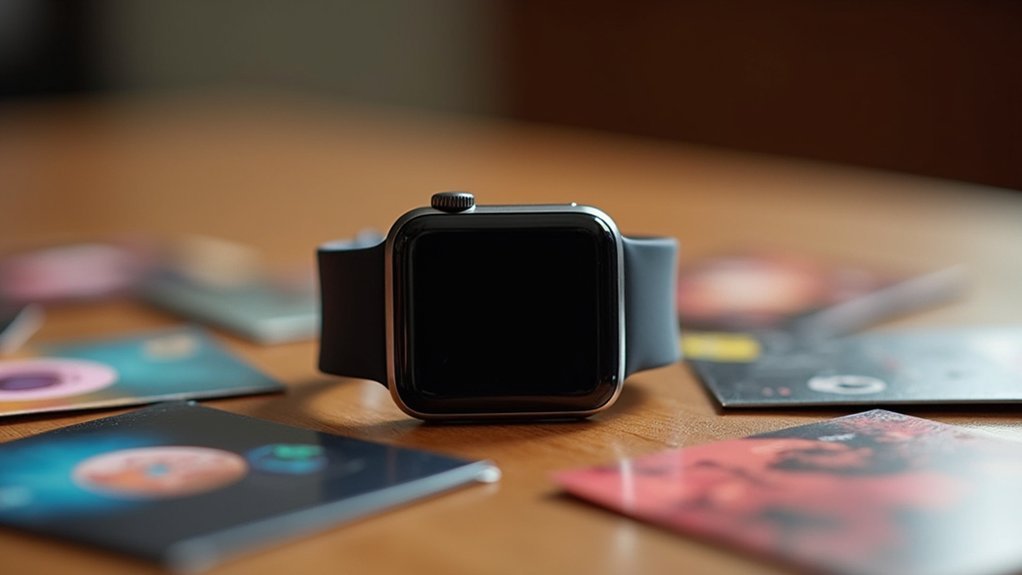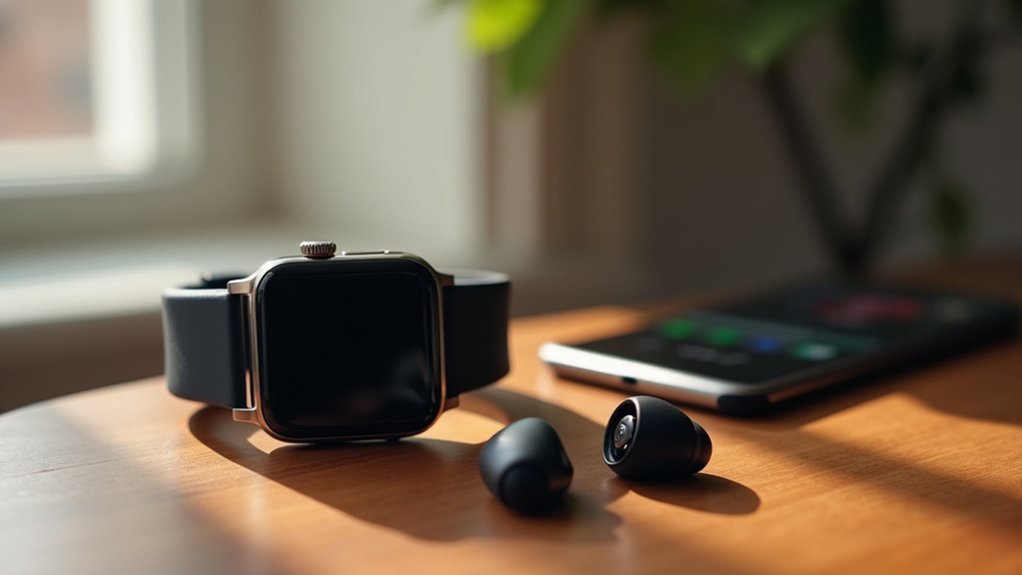The best sleep heart rate trackers for fitness enthusiasts include the Oura Ring Gen 4 for precise HRV measurements, WHOOP 4.0 for recovery analysis, and Samsung Galaxy Watch 7 with its advanced BioActive Sensor. Apple Watch Series 9 offers sleep apnea detection, while Withings ScanWatch 2 provides ECG readings without subscription fees. Budget options like Xiaomi Mi Smart Band and Fitbit Inspire deliver reliable data for casual users. Discover how these devices can transform your training by revealing your body’s true recovery status.
Why Sleep Heart Rate Monitoring Matters for Athletes

While many athletes focus on their heart rate during training sessions, what happens during sleep is equally essential for peak performance. Your body undergoes critical recovery processes during sleep, repairing damaged muscle tissue and replenishing energy stores.
Monitoring your sleep heart rate provides valuable insights into recovery status and stress levels. By tracking these metrics, you’ll identify potential issues before they lead to injuries and adjust your training accordingly. These wearable devices can evaluate sleep quality throughout the night, offering comprehensive reports of your recovery patterns.
Heart rate variability during sleep reveals how well you’re managing stress, allowing you to optimize recovery phases. With this data, you can customize training plans based on your unique physiological responses rather than following generic schedules.
This personalized approach enhances performance outcomes, whether you’re preparing for competition or improving daily workouts. Your sleep metrics ultimately become a powerful tool for athletic advancement.
Understanding Nighttime Heart Rate Metrics
Your sleep tracker reveals your resting heart rate during the night, providing a window into your cardiovascular health and fitness level.
The lowest point of your nighttime heart rate typically occurs during deep sleep phases when your body is most relaxed and recovering. Normal resting heart rates while sleeping can range from 40 to 100 BPM, varying significantly between individuals.
Heart rate variability (HRV) measurements capture the subtle timing differences between heartbeats, offering insights into your autonomic nervous system balance and recovery status.
Resting Heart Rate Insights
Most sleep trackers now measure heart rate during the night, providing valuable metrics that go beyond simple sleep duration. Your resting heart rate during sleep typically averages between 65-67 beats per minute, though this varies based on your fitness level and health status.
You’ll notice your heart rate fluctuates throughout different sleep stages—dropping lower during deep sleep and becoming more variable during REM sleep. These patterns offer insights into your recovery status and overall sleep quality. When you’re well-trained and properly recovered, you’ll often see lower nighttime heart rates.
Your tracker can detect meaningful changes in heart rate (usually over 10 beats per minute), which might indicate stress, overtraining, or dietary factors like late meals. A high HRV measurement during sleep typically indicates better relaxation and physiological adaptability.
HRV During Sleep
Beyond simple heart rate measurements, heart rate variability (HRV) represents a more sophisticated metric that sleep trackers now monitor. HRV measures the varying time intervals between consecutive heartbeats, providing deeper insights into your autonomic nervous system function during sleep.
When you’re sleeping, your body experiences minimal external stimuli, making it an ideal time to collect accurate HRV data. Higher HRV readings during sleep typically indicate that your body is in a rest-and-digest mode, controlled by the parasympathetic branch of your autonomic nervous system. Modern wearable devices combine HRV with accelerometer data to analyze your sleep stages—distinguishing between light, slow-wave, and REM sleep with reasonable accuracy.
For fitness enthusiasts, tracking nighttime HRV offers valuable information about stress levels, recovery status, and overall sleep quality. This non-invasive marker helps you optimize training schedules based on how well your body recovers during sleep, preventing overtraining and supporting peak performance.
Oura Ring Gen 4: The Gold Standard for Sleep HRV
When it comes to tracking sleep and heart rate variability, the Oura Ring Gen 4 stands in a class of its own. This non-allergenic titanium ring weighs just 3.3-5.2 grams and features recessed sensors that maintain ideal skin contact while you sleep. The sleek design is available in six color options, including Black, Silver, Gold, and the stylish Rose Gold.
What sets the Oura 4 apart for sleep HRV monitoring:
- Smart Sensing Technology – Its breakthrough algorithm adapts to your unique physiology, delivering scientifically validated HRV measurements throughout your sleep cycles.
- Continuous Monitoring – Tracks your heart rate variability all night without interruption, providing thorough recovery insights.
- Extended Battery Life – With up to 8 days between charges, you’ll get consistent sleep data without the hassle of daily charging.
Whoop 4.0: Recovery-Focused Heart Rate Analysis
WHOOP 4.0 tracks your physiological metrics 24/7, allowing you to understand exactly how well your body has recovered each day.
Its advanced heart rate monitoring technology integrates with sleep quality data to help you connect nighttime recovery with daytime performance capacity.
You’ll see clear correlations between your sleep patterns and workout strain, empowering you to make smarter training decisions based on your body’s actual readiness. The Health Monitor displays your live heart rate and key health metrics from your previous night’s sleep, providing a comprehensive view of your wellness status.
24/7 Recovery Monitoring
Unlike traditional fitness trackers that focus primarily on activity metrics, the WHOOP 4.0 stands out with its recovery-focused approach to heart rate analysis. The device continuously monitors your heart rate and heart rate variability (HRV) to assess your body’s recovery from physical stress.
Each day, you’ll receive a personalized recovery score that helps determine whether to push hard or take it easy. For optimal results, it’s recommended to wear WHOOP 24/7 to ensure continuous data collection for the most accurate insights.
The WHOOP ecosystem optimizes your performance through:
- Advanced sensor technology with four photodiodes and five LEDs collecting data 100 times per second
- Comprehensive health monitoring that tracks respiratory rate, blood oxygen levels, and skin temperature
- Predictive analytics that can detect potential illness onset by analyzing physiological changes over time
Sleep-Strain Relationship Insights
Through thorough sleep and activity monitoring, the WHOOP 4.0 establishes a clear connection between your daily exertion and recovery needs. This tracker quantifies your strain on a 1-20 scale, factoring in both physical and mental exertion to determine precisely how much sleep you’ll need for ideal recovery. The device tracks all four sleep stages to provide comprehensive recovery assessment.
| Strain Component | Impact on Sleep Requirements |
|---|---|
| Physical Exertion | Increases deep sleep needs |
| Mental Strain | Affects REM sleep quality |
| Circadian Rhythm | Influences sleep timing recommendations |
| Sleep Debt | Compounds recovery requirements |
| Heart Rate Zones | Indicates stress recovery patterns |
The device’s detailed analysis of heart rate variability (HRV) throughout your sleep cycle provides critical insights into how well you’re balancing activity and rest. When you’re accumulating sleep debt, WHOOP offers personalized recommendations to realign your recovery strategies with your performance goals.
Samsung Galaxy Watch 7: AI-Powered Sleep Heart Insights

Equipped with cutting-edge technology, the Samsung Galaxy Watch 7 revolutionizes sleep heart rate monitoring with its advanced BioActive Sensor. Using 13 precision LEDs, it continuously tracks your heart rate during sleep, providing detailed insights into heart rhythm variability and potential irregularities.
Transform your nights into data-rich insights with the Galaxy Watch 7’s precision heart monitoring technology.
You’ll receive personalized sleep coaching through Galaxy AI that analyzes your sleep patterns and heart data. The watch utilizes bioelectrical impedance analysis to track body composition alongside sleep metrics.
- FDA-authorized sleep apnea detection – World’s first smartwatch to monitor breathing patterns and heart rate variability for sleep apnea risk
- Daily Energy Score calculation – Estimates your physical readiness based on sleep quality and overnight heart rate trends
- Comprehensive health integration – Combines sleep heart data with fitness metrics to optimize recovery and training schedules
The 3nm processor guarantees uninterrupted monitoring with extended battery life for complete overnight tracking.
Apple Watch Series 9: Sleep Apnea Detection Features
Your Apple Watch Series 9 monitors overnight breathing disturbances that might indicate sleep apnea through its advanced sensor system.
The watch’s heart rhythm alert system notifies you of irregularities during sleep, potentially catching early warning signs of sleep-related breathing issues.
All sleep apnea indicators integrate with your broader sleep data in the Health app, creating a detailed picture that you can share with healthcare providers if concerning patterns emerge. You can review detailed respiratory rate measurements during sleep in the Health app for additional insights about your breathing patterns.
Overnight Breathing Disturbance Monitoring
Apple Watch Series 9 has revolutionized sleep tracking with its innovative sleep apnea detection capabilities. Using its accelerometer, the watch precisely monitors your breathing patterns while you sleep, identifying potential interruptions that might indicate sleep apnea.
This FDA-approved feature works exclusively on Series 9, Series 10, and Ultra 2 models running watchOS 11, and requires an iPhone with iOS 18 for full functionality. The system requires a minimum of 10 nights recorded within a 30-day period to properly analyze your breathing patterns.
- Comprehensive tracking – Monitors heart rate, breathing rate, and sleep stages for a complete picture of your sleep health
- Smart notifications – Alerts you when consistent signs of sleep apnea are detected
- Medical integration – Provides follow-up recommendations, including taking a home sleep test for confirmation
While not a substitute for professional diagnosis, this feature offers valuable initial screening for breathing disturbances.
Heart Rhythm Alert System
Beyond standard sleep tracking, the Heart Rhythm Alert System in Apple Watch Series 9 provides thorough cardiac monitoring throughout your sleep cycles.
This FDA-approved feature utilizes the watch’s accelerometer to detect breathing interruptions while you sleep. You’ll receive smart notifications directly on your watch when potential sleep apnea episodes are detected.
This non-invasive monitoring eliminates the need for clinical sleep studies while enabling early detection of conditions that might otherwise go unnoticed.
The system integrates seamlessly with other heart health features, including blood oxygen and continuous heart rate monitoring. These work together with motion sensors to calculate breathing patterns with impressive accuracy.
Setting up is simple on compatible models running watchOS 11, and the intuitive interface guarantees you’ll easily understand your sleep data and take appropriate action when necessary. The feature has also been made available on Ultra 2 models for those seeking premium health monitoring capabilities.
Sleep Data Integration
While you sleep, the Apple Watch Series 9 seamlessly integrates its sleep apnea detection data with the iPhone Health app, creating a thorough overview of your breathing patterns.
The watch’s accelerometer monitors your breathing disturbances, categorizing them as “Elevated” or “Not Elevated” and collects this information over a 30-day period.
You’ll find three key integration features:
- Easy setup through the Health Checklist with guided configuration
- Daily reports classifying your previous night’s breathing patterns
- PDF summaries you can share directly with healthcare providers
When consistent signs of moderate to severe sleep apnea appear, you’ll receive notifications with timing details. You can conveniently manage these alerts by turning off notifications through the Health Checklist menu if needed.
This FDA-approved feature isn’t a replacement for clinical diagnosis but serves as an effective screening tool that prompts medical consultation when needed.
Withings Scan Watch 2: Subscription-Free Heart Monitoring
Unlike many competitors that lock health metrics behind paywalls, the Withings ScanWatch 2 offers extensive heart monitoring without subscription fees.
You’ll get complete access to ECG readings, continuous heart rate tracking, and irregular heartbeat notifications without recurring costs.
The device monitors your heart throughout sleep cycles, tracking variability across deep, light, and REM stages to assess sleep quality.
While you sleep, the ScanWatch 2 analyzes your heart’s rhythm across each sleep stage, revealing the true quality of your rest.
It also detects breathing disturbances that might indicate sleep apnea by analyzing your ECG, heart rate, and respiratory data.
The watch provides comprehensive Sleep Quality Score each morning based on its AI-calibrated analysis of your night’s rest.
With up to 30 days of battery life, you won’t miss critical measurements during recharges.
The watch’s additional health features—SpO2 monitoring, temperature tracking, and VO2 Max estimates—complement heart data for thorough fitness insights, all viewable on its clear grayscale OLED display.
Galaxy Ring vs. Oura: Heart Rate Tracking Comparison
As the newest contenders in the smart ring space, Samsung’s Galaxy Ring and Oura Ring Gen3 deliver nearly identical heart rate tracking accuracy during sleep monitoring.
Both rings excel at continuous heart rate tracking with minimal differences in performance during side-by-side testing.
The Galaxy Ring specifically flags high and low heart rates, while Oura provides more detailed in-app heart rate data visualization and trending insights through its third-generation technology. Both devices measure blood oxygen levels with comparable precision during sleep.
- Sleep accuracy: Both rings track extensive sleep stages and quality metrics with similar precision.
- Battery performance: Oura offers proven multi-day battery life while Galaxy Ring includes a convenient charging case.
- Cost considerations: Oura requires a monthly subscription for premium features while Galaxy Ring doesn’t have recurring fees.
Best Budget Options for Sleep Heart Rate Tracking
Three excellent budget options stand out for those seeking affordable sleep heart rate tracking without sacrificing essential features.
The Xiaomi Mi Smart Band offers impressive value under $50 with reliable heart rate monitoring and sleep stage tracking. Its long battery life means you won’t need frequent charging.
Fitbit Inspire provides a solid middle-ground option with intuitive sleep analytics and heart rate tracking in a comfortable design that won’t disturb your rest. Unlike premium options like the Oura Ring Gen 4 that has been validated against polysomnography sleep lab tests, these budget devices offer reasonable accuracy for casual users.
For slightly more investment, entry-level Garmin models deliver robust sleep metrics with exceptional accuracy.
When choosing your budget tracker, consider whether subscription costs apply, check user reviews for reliability reports, and verify compatibility with your smartphone.
The best affordable options balance core sleep tracking capabilities with comfort and battery performance without breaking the bank.
Non-Wearable Alternatives for Heart Rate Monitoring
For those who find wristbands uncomfortable during sleep, non-wearable heart rate monitoring options offer a compelling alternative.
These technologies track your cardiac activity without physical contact, giving you comfort while maintaining accurate health insights. Recent advancements in Wi-Fi CSI technology have demonstrated accuracy rates of up to 96.8% in heart rate estimation.
- Bed-integrated sensors – Mattress-embedded pressure and piezoelectric sensors detect your heartbeat through subtle body movements, seamlessly integrating with sleep tracking ecosystems.
- Camera and Wi-Fi based systems – These capture heart rate through skin color changes (PPG) or analyze signal variations from chest movements without any attached devices.
- Ballistocardiography (BCG) – Smart pillows and bed frames measure the recoil forces from your heartbeat, providing consistent overnight monitoring despite body movements.
Though slightly less precise than contact methods, these solutions deliver reliable trend data while you sleep undisturbed.
Interpreting Your Nighttime Heart Rate Data
Making sense of your sleep heart rate data doesn’t need to be overwhelming, even with the wealth of information modern trackers provide. Your baseline sleep heart rate typically ranges from 60-100 beats per minute, with natural variations of about 8 BPM between nights.
When analyzing your data, look for patterns rather than single-night anomalies. Higher nighttime heart rates might indicate pre-sleep exercise, stress, alcohol consumption, or poor sleep quality. Women generally have higher rates than men, and your rate typically decreases with age.
For truly meaningful insights, track your heart rate variability (HRV). Higher HRV suggests better recovery and lower stress levels. Morning measurements when you’re rested provide the most reliable HRV readings for assessing your recovery status.
Compare current readings to your personal baseline to detect potential overtraining or recovery issues. This personalized approach helps you optimize training intensity and manage stress effectively.
How Sleep Heart Rate Affects Training Performance
Your nighttime heart rate does more than just provide data—it serves as a window into your body’s recovery and readiness for training. When your sleep heart rate remains stable across multiple nights, it typically indicates good recovery and balanced training load. Conversely, elevated readings suggest your body needs more rest before pushing hard again.
- Performance prediction – Consistently high sleep heart rate correlates with reduced endurance capacity, greater perceived exertion, and poorer athletic performance in subsequent sessions.
- Injury prevention – Lower parasympathetic activity during sleep (shown by higher heart rate) increases injury risk through compromised recovery and slower reaction times. During deeper sleep stages, your heart rate slows naturally, allowing optimal cardiovascular recovery essential for athletic performance.
- Sport-specific impacts – Endurance athletes face reduced glycogen and stamina with elevated sleep heart rate, while precision sports see decreased accuracy and focus.
Future Trends in Sleep Cardiovascular Monitoring
As wearable technology continues to evolve, sleep cardiovascular monitoring is entering an exciting new era of innovation.
Contact-free monitors using radar and infrared sensors will soon track your heart metrics without physical contact, improving comfort for long-term use. New devices like the Withings Sleep Rx Mat offer home screening capabilities for sleep-disordered breathing while monitoring cardiovascular metrics.
AI integration is revolutionizing how your data gets analyzed, with algorithms that learn your unique patterns and predict potential cardiovascular issues before they become serious.
You’ll receive personalized recommendations rather than generic advice.
Multi-parameter wearables now combine heart rate with SpO2, HRV, and even ECG functionality to create a thorough picture of your nighttime cardiovascular health.
Some devices are beginning to incorporate blood pressure monitoring and biochemical markers from sweat, offering unprecedented insight into how your heart functions during sleep.
Frequently Asked Questions
Can Sleep Trackers Interfere With Sleep Quality or Create Anxiety?
Yes, sleep trackers can interfere with your sleep quality by creating anxiety when you’re too focused on metrics. You’ll sometimes worry about not meeting sleep goals, which paradoxically disrupts your natural rest patterns.
How Often Should I Replace or Upgrade My Sleep Tracker?
You should replace your sleep tracker every 2-3 years for ideal accuracy. Consider upgrading when you notice battery degradation, inconsistent readings, or when software updates cease. Earlier replacement may be needed if your health tracking needs change.
Do Sleep Trackers Work for People With Irregular Sleep Schedules?
Yes, sleep trackers work well for irregular sleepers. They adapt to your changing patterns, track quality regardless of timing, and can help you identify trends that might affect your health and performance.
Are Sleep Trackers Suitable for Children or Teenagers?
Yes, sleep trackers can be suitable for children and teenagers, especially older ones. You’ll find they help establish healthy sleep patterns, but you should monitor their use to prevent anxiety or technology dependence.
Do Medications Affect the Accuracy of Sleep Heart Rate Data?
Yes, medications can affect your sleep heart rate data accuracy. Beta-blockers, decongestants, and other heart-altering drugs can change your heart rate variability, potentially skewing readings from your tracking device during sleep.
In Summary
You’ll gain powerful insights by tracking your sleep heart rate with today’s advanced devices. Whether you choose a ring, band, or non-wearable, the data helps you optimize recovery and training. By understanding your nighttime cardiovascular patterns, you’re taking control of your fitness journey. As technology continues to evolve, you’ll benefit from even more sophisticated sleep monitoring to maximize your athletic potential.





Leave a Reply